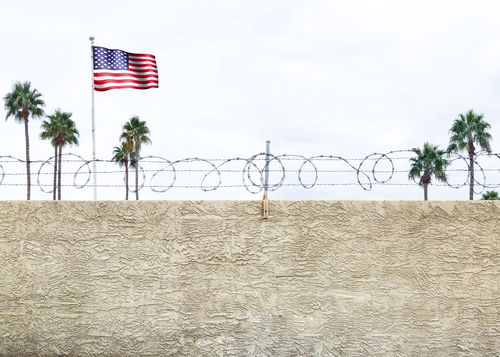
As a companion to House-passed legislation H.R. 2, U.S. Sen. Ted Cruz (R-TX) last week introduced the Secure the Border Act of 2023, proposing a resumption of border wall construction, harsher asylum and visa standards, and more Border Patrol agents.
Known as S. 2824, the Senate version of the bill received significant Republican co-sponsorship, but no Democrat backers. It was also openly supported by the anti-immigrant groups NumbersUSA and Federation for American Immigration Reform (FAIR).
“Under Joe Biden, we have a wide-open southern border,” Cruz said. “The Biden Border Crisis has created the largest illegal immigration crisis in our nation’s history. Biden’s open borders are an invitation for the cartels to brutalize children, to assault women, to overrun our communities with illegal aliens, and to flood this country with narcotics and fentanyl that kill over 100,000 people per year. This bill would stop the Biden Border Crisis dead in its tracks by building the wall, ratcheting up asylum standards, increasing the number of Border Patrol Agents, and implementing effective border security policies.”
The bill would require the Department of Homeland Security (DHS) to resume border wall construction regardless of who is in charge, increase its number of agents on staff and restrict asylum solely to immigrants who appear at ports of entry and who can prove there that they are more likely than not to qualify.
DHS’s ability to grant parole to illegal aliens would be severely restricted, and its CBP One app would have to be kept from use by illegal immigrants. To help Customs and Border Patrol (CBP) with enforcement, the bill also proposed giving CBP access to the criminal history databases of all countries of origin and transit for those encountered at the southern border.
The cost of visa overstays would also go up, punishing legal immigrants as well. For a first offense, violators would be hit with a misdemeanor and an up to $1,000 fine, while a second violation would earn them a felony, and up to a $2,000 fine and two years imprisonment. Private organizations operating within the U.S. would also be targeted, however, and non-governmental organizations (NGOs) would be forbidden from using tax dollars to transport or lodge illegal immigrants, or even to provide legal representation to them.
The White House earlier this year denounced the House version of the bill, arguing that it should be rejected for doing nothing to address the root causes of migration, while cutting humanitarian protections and restricting lawful pathways.
“The bill would cut off nearly all access to humanitarian protections in ways that are inconsistent with our Nation’s values and international obligations,” the White House said in a statement in May. “In addition, the bill would make processing less efficient by prohibiting the use of the CBP One mobile application to process noncitizens and restricting DHS’s parole authority, such that successful programs, like “Uniting for Ukraine,” would be prohibited. The bill would also reduce authorized funding for essential programs including the Shelter and Services Program that provides a critical source of funds for state and local governments and reduces pressure at the border. While we welcome Congress’ engagement on meaningful steps to address immigration and the challenges at the border, this bill would make things worse, not better.”




